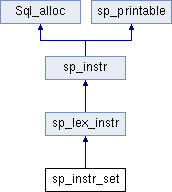|
My Project
|
|
My Project
|
#include <sp_instr.h>

Public Member Functions | |
| sp_instr_set (uint ip, LEX *lex, uint offset, Item *value_item, LEX_STRING value_query, bool is_lex_owner) | |
| virtual void | print (String *str) |
| virtual bool | exec_core (THD *thd, uint *nextp) |
| virtual bool | is_invalid () const |
| virtual void | invalidate () |
| virtual bool | on_after_expr_parsing (THD *thd) |
| virtual LEX_STRING | get_expr_query () const |
sp_instr_set represents SET-statememnts, which deal with SP-variables.
| bool sp_instr_set::exec_core | ( | THD * | thd, |
| uint * | nextp | ||
| ) | [virtual] |
Execute core function of instruction after all preparations (e.g. setting of proper LEX, saving part of the thread context).
| thd | Thread context. |
| nextp[out] | next instruction pointer |
Implements sp_lex_instr.
| virtual LEX_STRING sp_instr_set::get_expr_query | ( | ) | const [inline, virtual] |
Reimplemented from sp_lex_instr.
| virtual void sp_instr_set::invalidate | ( | ) | [inline, virtual] |
Invalidate the object.
Implements sp_lex_instr.
| virtual bool sp_instr_set::is_invalid | ( | ) | const [inline, virtual] |
| false | if the object (i.e. LEX-object) is valid and exec_core() can be just called. |
| true | if the object is not valid any longer, exec_core() can not be called. The original query string should be re-parsed and a new LEX-object should be used. |
Implements sp_lex_instr.
| virtual bool sp_instr_set::on_after_expr_parsing | ( | THD * | thd | ) | [inline, virtual] |
Callback function which is called after the statement query string is successfully parsed, and the thread context has not been switched to the outer context. The thread context contains new LEX-object corresponding to the parsed query string.
| thd | Thread context. |
Reimplemented from sp_lex_instr.
 1.7.6.1
1.7.6.1